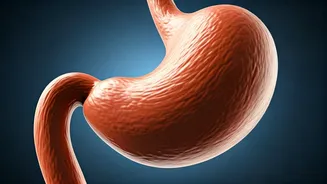Hormonal Imbalances' Effect
Hormones play a huge role in fat storage, and when they're off balance, it becomes harder to lose weight. For example, high cortisol levels, often triggered
by stress, can lead to increased fat storage, especially around the abdomen. Similarly, fluctuations in estrogen and testosterone can influence how your body handles fat. Insulin resistance, another hormonal issue, can also contribute to belly fat accumulation, as it affects the way your body processes sugar. Therefore, addressing hormonal imbalances is crucial for effective fat loss. This might involve lifestyle changes such as stress management, diet adjustments, or in some cases, medical intervention to regulate hormonal levels and support your body's natural fat-burning processes. It's important to consult with a healthcare professional to identify and address any specific hormonal issues impacting your weight loss journey.
Ignoring Protein Intake
Protein is a crucial nutrient for weight loss. It helps you feel full, which can reduce overall calorie intake and prevent overeating. Protein also boosts your metabolism, as the body uses more energy to digest and process it compared to carbs or fats. Furthermore, protein plays a critical role in preserving muscle mass during weight loss; muscle helps burn calories even when you're at rest. Not consuming enough protein could hinder your ability to reduce belly fat. Aim to include protein-rich foods in every meal, like lean meats, poultry, fish, eggs, and plant-based sources like beans and lentils. Prioritizing protein can help ensure that you lose fat rather than muscle, leading to more sustainable and effective results. This means incorporating a protein source with each meal to support satiety, muscle preservation, and overall metabolic function.
The Wrong Workouts
While exercise is crucial for weight loss, the type of workout matters. Focusing solely on cardio, while beneficial for overall health, may not be as effective for belly fat reduction compared to incorporating strength training. Strength training builds muscle, which boosts your metabolism and helps burn more calories even when you're not exercising. High-intensity interval training (HIIT) is another effective method, as it combines short bursts of intense exercise with brief recovery periods, leading to significant calorie burn and improved fat loss. Consider a workout routine that blends both cardio and strength training. This combination will optimize your efforts to reduce belly fat. Ensure your fitness plan includes a variety of exercises to challenge different muscle groups and keep your body adapting. Remember that consistency and combining the right type of exercise are key.
Poor Sleep Quality's Impact
Getting enough sleep is incredibly important for weight management. When you don’t get sufficient sleep, your body produces more ghrelin (the hunger hormone) and less leptin (the satiety hormone), which can lead to increased appetite and cravings. Lack of sleep also affects cortisol levels, increasing the likelihood of fat storage, especially around the abdomen. Sleep deprivation further impairs your body's ability to regulate blood sugar, contributing to insulin resistance and fat accumulation. Aim for 7–9 hours of quality sleep each night to support your weight loss efforts. Create a relaxing bedtime routine to help you wind down. This might involve a consistent sleep schedule, a dark and quiet sleep environment, and avoiding screen time before bed. Prioritizing sleep is not only important for weight loss but also for overall health and well-being, helping to balance hormones and regulate hunger signals.
High Stress Levels
Chronic stress significantly affects your body’s ability to lose weight. When you're stressed, your body produces excess cortisol, which can lead to increased fat storage, particularly in the abdominal area. Stress also causes your body to retain more water, making you feel bloated and heavier. This can result in poor eating habits, like consuming comfort foods high in sugar, fat, and processed ingredients. Finding effective ways to manage stress is crucial. You could consider techniques like meditation, deep breathing exercises, yoga, or spending time in nature. Engaging in enjoyable activities, maintaining a healthy social life, or seeking professional help can all significantly contribute to stress reduction. Incorporating stress-reducing practices into your daily routine and building a more balanced lifestyle can support weight loss, decrease cortisol levels, and help you reach your goals.













